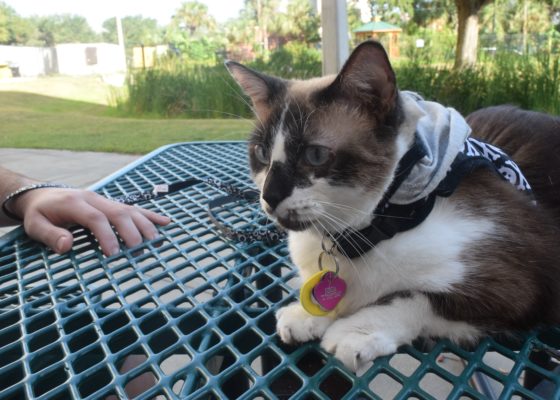Sean Ross’ Siamese mix, Ninja, is more than just a friend – she’s his coping mechanism.
Diagnosed with obsessive-compulsive disorder and anxiety by his psychiatrist, Ross said he was often teased throughout his life.

“Since elementary school, I used to play with my shirt in a way to try and relieve anxiety [because] I had a lot of anxiety as a kid,” Ross said.
“My mother brought me to a psychiatrist to try all sorts of different drugs. In the meantime, kids don’t like other kids that are different, so I got picked on all the time. I wouldn’t say I had the worst childhood, but it definitely wasn’t super pleasant.”
Ross previously lived off campus, then moved on campus to help lessen his anxiety. He got Ninja during the second week of class after Housing and Residence Life approved his campus housing application.
“I learned about getting a support animal, so I asked my psychiatrist if it was okay and she said yes,” said Ross.
In order to have a support animal in a dorm, a student must provide proof of a disability given out by a doctor or psychiatrist.
USFSP’s Student Disability Services will review the documentation and pass the process on to campus housing.
Ross said the hardest part was acquiring the document of disability
“I got a cat specifically because it wouldn’t be loud in the dorms and all I have to do is feed it, water it and love it,” Ross said.
Since then, Ninja has helped Ross, a junior biology major, during stressful times at USFSP.
“The night before my first organic chemistry exam I was freaking out,” Ross said.
“I didn’t have any people [to] study with. I figured I would just lecture to my cat and that’s literally what I did. I looked at my notes and read back the important things to my cat. That’s how I was able to learn organic chemistry.”
Ross also said that having a pet like Ninja could help others relieve anxiety.
“Anxiety is a huge thing, especially at this school because most people are biology majors taking pre-med and pre-veterinary classes,” Ross said.
“Not to mention they have to take an exam just to get into some of the classes and be stellar individuals outside of class as well. I feel like having an animal would help regardless if you have a severe disability or not. I know people like just coming up and petting her. I feel like just walking her around helps others with their anxiety as well.”
According to USF Policy 6-033, USF System officials will determine, on a case-by-case basis, and in accordance with applicable laws and regulations, whether such an animal is a reasonable accommodation on campus.
The USF System may require sufficient information and documentation to enable the Student Disability Services (student requests) or Human Resources (employee requests) to establish eligibility for reasonable accommodations and the animal’s qualification as a service or assistance animal under the applicable laws.
Despite this, Ross would someday like to see the school adopt a more inclusive policy with animals on campus.
“At Eckerd College, [students] don’t have to have a disability to have an animal,” Ross said. “It just has to be small and follow certain rules. They’ve been around for a long time and have been pretty successful. Maybe if we could follow their program it would be cool.”
Eckerd College, a local private university, has welcomed pets on campus since 1973. The campus offers dorms designated for bigger animals like cats and dogs, and even a separate ceremony for animals leaving, or “graduating,” the school.
Ross says that if anyone ever wanted to meet or visit Ninja they should reach out to him on campus.
Photo By Jonah Hinebaugh | TCN



